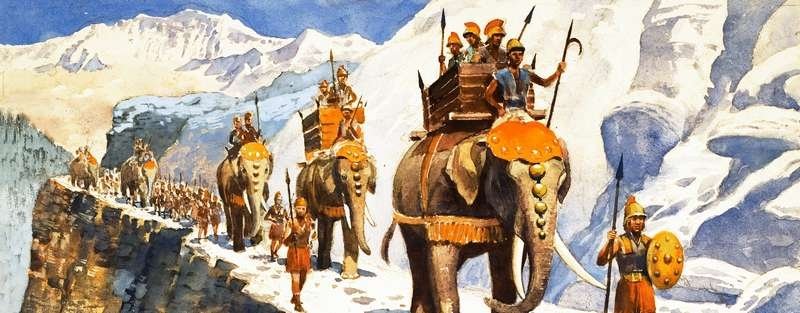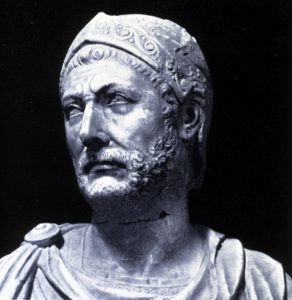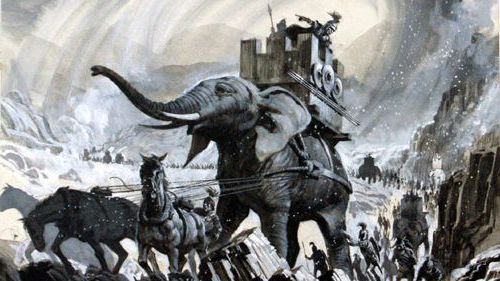
PHOTO: socialstudiesforkids.com
The very idea of the war elephant is almost synonymous with the great Carthaginian general: Hannibal. He was able to win battles with them on their sheer terror factor alone. Imagine, for a moment, that you’re a soldier in a Roman army. You’ve never seen an elephant before. Imagine facing a line of Carthaginian soldiers, and on the horizon looms this armored creature, up to eleven feet tall, maybe six thousand pounds of armored fury, and that creature comes charging at you. It was enough to scatter any army! Hannibal’s armored war elephants are, perhaps, one of the coolest bits of ancient war history. They’ve inspired the imaginations of storytellers for centuries, including the famous J.R.R Tolkien, who re-purposed the idea of Hannibal’s war elephant for his Mûmakil. They were the general’s favorite superweapon. Unfortunately for Hannibal, though, they were also his biggest weakness.

PHOTO: historum.com
First, a little background on Hannibal Barca, and why exactly he wanted to use something like war elephants to destroy Rome. Hannibal lived during a period of enormous tension in the Mediterranean. He’s often regarded as one of the greatest military strategists to have ever lived, and is, unquestionably, one of the greatest generals of the ancient world. Hannibal was a child during the First Punic War– a war between the Roman Empire, and Carthage, surrounding a power struggle between the two empires. When Hannibal’s father and older brother died, Hannibal took over the Carthaginian army and led it against Rome in the Second Punic War in 218 BC. He literally wanted to destroy Rome, like, burn it to the ground, because he so believed in the supremacy of Carthage and the superiority of his own people over the Romans. He almost succeeded, almost. Unfortunately, Hannibal’s assault on Rome meant that he had bitten off slightly more than he could chew, and his war elephants didn’t help that fact. Managing them was a logistical nightmare for his army, and it could be said that his love of war elephants was partially responsible for Hannibal’s downfall and his failure to capture Rome.
Nobody can quite agree on where Hannibal got his elephants from. During Hannibal’s time (247 to 183 BC), there were only two varieties of elephant in existence: Asian, and African. Carthage wasn’t exactly very near either of these areas by the ancient world’s standards, and it would’ve been quite an ordeal to obtain the animals. It isn’t clear to historians whether Hannibal used Asian elephants, African elephants, or a combination of both in his army. But, it’s most likely that he used mostly Asian elephants. African elephants run larger than their Asian cousins, and are harder to control. An army like Hannibal’s would need elephants that could be well-trained and manageable, so Asian elephants seem the most likely choice.
The story goes that, in a battle, Hannibal would armor up his elephants, give alcohol with them to get them drunk, and then antagonize them by poking their ankles with spears. Animal cruelty aside, it was an excellent strategy. The elephants, completely drunk and worked up into a fury were easy to work with at that point. All Hannibal had to do was set them loose on the opposing army, and they’d go crashing through the enemy lines, wreaking havoc. It was the easiest way to force an enemy to break their lines and retreat known to mankind.

PHOTO: zmescience.com
The trouble with elephants, of course, is that they’re big. They eat a lot of fodder in a day, and Hannibal had sixty in his army that he had to take care of. He did fine, for a while, when the Romans were actually meeting him on the field of battle. He could use the elephants to force the Roman army into retreat, up the body count, and utterly massacre them on the battlefield. The trouble started when the Romans started to realize that the only way to defeat Hannibal was by a strategy called attrition– basically, they hid in holes, practiced guerilla war tactics, and slowly let Hannibal’s army waste away. Hannibal had no way to fight an army that simply wasn’t there, especially with elephants. Eventually, all his elephants were doing was eating food and forcing him to carry extra stuff around with him to feed them. By the time Hannibal was actually on his way to Rome, many of his own officers advised him to leave the elephants behind. They were only a hindrance, they said. But Hannibal loved his superweapon too much, and his vision of crushing Rome was too important to him, and he needed those elephants to break Rome for good.
Crossing the Alps should have taken Hannibal one week. With his elephants, it took him two. In that time, he lost over half his army, and all but one of his elephants. The animals simply couldn’t withstand the harsh terrain, and his army simply couldn’t sustain their huge appetites and control them properly. By the time Hannibal came out on the other side of the alps, his army was far too weak to be able to sustain a march on Rome itself. Many historians argue that if Hannibal had listened to his officers and left his elephants behind, he would have been able to take the city of Rome and fulfill his vision of destroying the greatest empire the western world has ever known. I guess we’ll never truly know whether this was the biggest mistake of the famous general’s career or not, I’ll leave that for you to decide.

